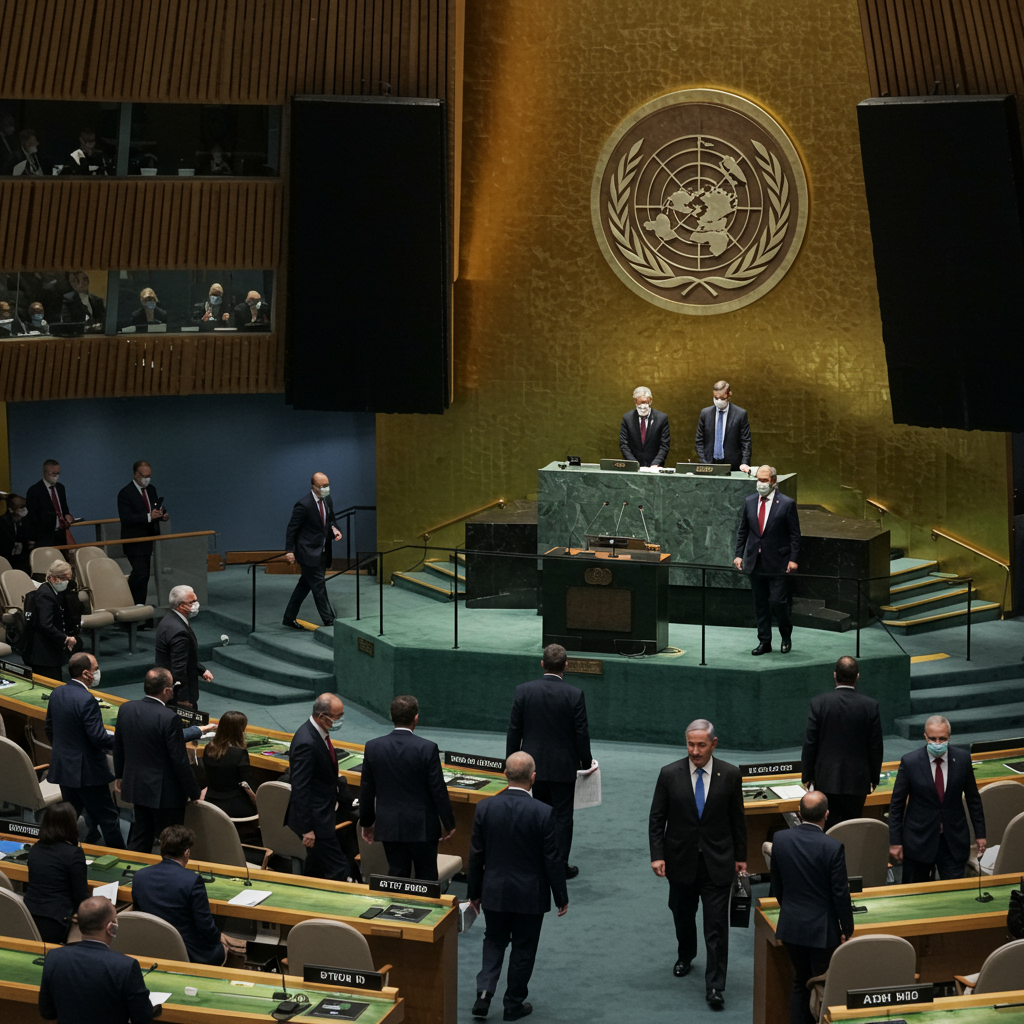When global leaders gather at the United Nations, a walkout can be a powerful, silent protest. These dramatic exits signal deep disapproval and highlight moments of intense international disagreement. Recently, dozens of delegates conspicuously left the General Assembly Hall during Israeli Prime Minister Benjamin Netanyahu’s address, underscoring growing global pressure regarding the Gaza conflict. This act of protest, while not new, continues to serve as a stark visual representation of diplomatic discord and a nation’s increasing isolation on the world stage.
Understanding the Symbolic Power of a UN Walkout
A United Nations walkout is a deliberate, symbolic gesture. Delegates leave a session or an address, often en masse, to express condemnation, dissent, or outrage. This action communicates a collective message of non-endorsement. It suggests the speaker or their message is unacceptable to the departing nations. Unlike a formal vote or resolution, a walkout is a direct, visible protest. It transforms the usually decorous assembly hall into a stage for geopolitical drama. This form of diplomatic protest gains significance during periods of heightened international tension, demonstrating a clear line in the sand.
The Latest Catalyst: Protests Against Benjamin Netanyahu
The most recent high-profile walkout occurred on September 26, 2025. Numerous UN delegates departed the General Assembly as Israeli Prime Minister Benjamin Netanyahu began his speech. This protest specifically targeted Israel’s ongoing military campaign in Gaza. Critics cited a severe humanitarian crisis. Reasons for the walkout included reports of famine, Israel’s blockade of aid, and plans for a full invasion. According to the Gaza Health Ministry, over 65,000 Palestinians had died since October 2023. These numbers illustrate the devastating human cost.
The protest also highlighted Israel’s perceived isolation. Several nations, including France, Canada, and the United Kingdom, had formally recognized Palestine as an independent state. New York City mayoral candidate Zohran Mamdani even pledged to arrest Netanyahu on war crimes charges if he entered the city. A UN commission had recently found Netanyahu’s government committing genocide against Palestinians in Gaza. Experts like Trita Parsi of the Quincy Institute observed the walkout’s unusual scale. He called it a clear symbol of Israel’s “near-total isolation” within the international community.
Netanyahu’s Defiance Amidst Mounting Isolation
Despite the exodus of delegates, Netanyahu delivered a defiant and unapologetic address. He asserted Israel’s resolve to “finish the job” against Hamas. He declared, “Western leaders may have buckled under the pressure,” but Israel “won’t.” His speech was met with scattered applause. Unintelligible shouts occasionally punctuated the hall. Netanyahu routinely accused his critics of antisemitism. He stated, “Anti-semitism dies hard. In fact, it doesn’t die at all.”
He condemned countries recognizing an independent Palestinian state. He argued such actions would “encourage terrorism against Jews and against innocent people everywhere.” Netanyahu used visual aids, including a map titled “THE CURSE.” He wore a special QR code pin, encouraging viewers to “remember October 7.” He even claimed his speech was broadcasting directly into Gaza via military loudspeakers and mobile phones, though journalists reported no immediate evidence. His stance, contradicting the “two-state solution,” remained absolute. He reiterated his belief that such a state “will not happen.”
A History of Dissent: Notable UN Walkouts
While the 2025 walkout against Netanyahu garnered significant attention, similar protests have occurred over the years. These events underscore persistent geopolitical fault lines. They reveal how diplomatic dissatisfaction manifests in the world’s most prominent international forum.
Protests Against Israeli Leaders
Delegates previously walked out of Netanyahu’s General Assembly speech in 2024. That protest also condemned the war on Gaza and Israeli attacks on Lebanon. Such repeated actions illustrate a consistent pattern of international objection. The incidents reflect deepening concerns over Israeli policies in the region. These walkouts suggest a hardening stance from many nations.
Against Russian Leaders
Russia has also faced strong condemnation through UN walkouts. In 2025, dozens of dignitaries walked out of Russia’s speech to the UN Human Rights Council in Geneva. This action showed solidarity with Ukraine. Earlier, in 2022, over 100 diplomats from about 40 countries protested. They left a speech by Russian Foreign Minister Sergei Lavrov in Geneva. Their walkout was a direct response to Russia’s invasion of Ukraine. These events clearly signal widespread international disapproval of Russia’s aggressive actions.
Against Iranian Leaders
Iranian leaders have also been the subject of diplomatic walkouts. U.S. diplomats frequently walked out of former Iranian President Mahmoud Ahmadinejad’s remarks. They even skipped his speech entirely on some occasions. In 2010, American diplomats and other delegations walked out. Ahmadinejad claimed “most nations” believed the 9/11 attacks were orchestrated by the U.S. The following year, in 2011, he attacked the U.S. and other major powers. He labeled them militarists and imperialists. Such provocations often trigger immediate diplomatic censure.
More Than a Gesture: The Broader Implications of Diplomatic Protests
UN walkouts are far more than mere theatrical displays. They carry significant weight in the delicate balance of international relations. These actions serve multiple critical functions within global diplomacy.
Signaling Isolation and Disapproval
A mass walkout visually demonstrates a nation’s or a leader’s isolation. It sends an unmistakable message of collective disapproval. When a speaker addresses a “sea of empty seats,” as Netanyahu did, the message is clear. Their position is deeply contentious. This isolation can be profoundly damaging to a nation’s diplomatic standing. It can erode alliances and make future cooperation more challenging. The sheer scale of recent walkouts points to a significant shift in global sentiment.
Shifting Global Consensus
Walkouts can reflect and even contribute to a shifting global consensus. The increasing number of countries recognizing a Palestinian state after October 7 is one such example. This movement includes key allies of Israel. The UN General Assembly had also passed a nonbinding resolution. It urged Israel to commit to an independent Palestinian nation. These diplomatic actions, underscored by walkouts, show an evolving international perspective on the Israeli-Palestinian conflict. They indicate a growing rejection of unilateral actions.
Impact on Leaders and Policy
While walkouts may not immediately alter policy, they exert pressure. They contribute to a cumulative effect of international condemnation. This pressure can influence domestic political discourse. It can also encourage external actors to rethink their alliances. For leaders facing war crime charges, like Netanyahu from the ICC, such protests intensify their legal and moral scrutiny. The repeated occurrence of these events signals a broader refusal to legitimize certain narratives or actions.
The Geopolitical Landscape: Why Walkouts Are Increasing
The increasing frequency of UN walkouts reflects a more polarized and volatile global landscape. Major conflicts, humanitarian crises, and a perceived disregard for international law fuel these protests. The Gaza conflict serves as a prime example. The devastating death toll and humanitarian catastrophe have sparked widespread global outrage. This outrage translates into visible diplomatic actions.
Moreover, leaders like Netanyahu, despite facing significant international pressure, often maintain defiant stances. This creates an environment where traditional diplomatic channels may feel insufficient. Walkouts become a necessary outlet for expressing deep ethical and political disagreements. They highlight the growing tension between national interests and international norms. As global challenges intensify, these acts of symbolic protest may become even more common.
Frequently Asked Questions
What is the primary significance of a UN delegate walkout?
A UN delegate walkout is a powerful symbolic gesture of protest. It signifies a collective condemnation or disapproval of a speaker, their policies, or their statements. While it doesn’t directly change policy, it visually demonstrates a nation’s isolation and highlights deep international disagreement. It serves as a visible indicator of shifting global consensus and publicizes diplomatic strain, sending a strong message of non-endorsement to both the speaker and the wider international community.
Which world leaders have most frequently faced UN walkouts, and why?
Leaders from Israel, Russia, and Iran have most frequently faced UN walkouts in recent years. Israeli Prime Minister Benjamin Netanyahu has been protested multiple times due to the Gaza conflict, allegations of war crimes, and ongoing humanitarian crises. Russian leaders, like Foreign Minister Sergei Lavrov, have seen walkouts in protest of the invasion of Ukraine. Former Iranian President Mahmoud Ahmadinejad faced repeated walkouts for controversial statements, including those regarding the 9/11 attacks and critiques of Western powers. These incidents typically stem from widely contentious geopolitical actions or inflammatory remarks.
How have recent UN walkouts, particularly against Israeli Prime Minister Netanyahu, impacted international diplomacy?
Recent UN walkouts against Israeli Prime Minister Netanyahu have significantly underscored Israel’s increasing international isolation. They highlight a growing global consensus questioning Israel’s actions in Gaza, especially amid calls for Palestinian statehood recognition and allegations of war crimes. While direct policy changes are rare, these protests intensify diplomatic pressure, erode international alliances, and amplify calls for accountability. They reflect a hardening stance from many nations and contribute to a narrative of disapproval, making it more challenging for the targeted leader to garner support or legitimacy on the world stage.
Conclusion
United Nations walkouts are powerful, albeit symbolic, expressions of global dissent. From protests against Russian aggression in Ukraine to condemnation of Iranian leaders’ controversial remarks, these actions consistently highlight moments of deep international division. The recent mass walkout during Benjamin Netanyahu’s address, fueled by the devastating conflict in Gaza, underscores the ongoing pressure on Israel and its increasing isolation. These diplomatic protests, while not direct policy shapers, profoundly impact a nation’s international standing and reflect the shifting tides of global opinion. They serve as a crucial barometer for the world’s most pressing geopolitical challenges, reminding us that even in formal diplomacy, silence can speak volumes.




